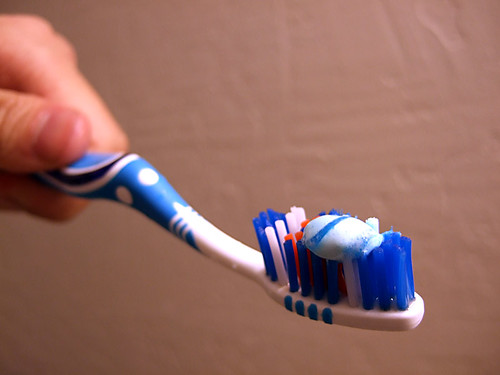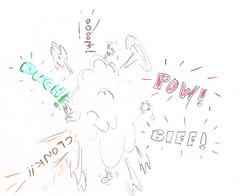Being digitally literate is not just about knowing how to use programs or being aware of copyright law. It’s also about being able to ask the right questions. This is another reason to have a news section in your Computing lessons, in addition to the 5 reasons to have a Computing news section of your lessons I wrote about previously: having a news section gives pupils the opportunity to practise asking pertinent questions. It doesn’t even matter if the questions cannot be answered immediately: the point of the exercise is to exercise the questioning “muscles” in your brain.
 Photo by Kenneth Lu https://www.flickr.com/photos/toasty/
Photo by Kenneth Lu https://www.flickr.com/photos/toasty/
Take a news item of the last week or so: a toothbrush that can analyse your DNA to check whether you have early onset Alzheimer’s Disease or cancer. Silicon microchips embedded in the toothbrush would read and decode your DNA, and then evaluate the results against known genetic markers for those diseases. The microchips could, in fact, be embedded in anything, including toothpaste.
All very wonderful, but for me it raises a number of questions:
- How accurate would the data or the evaluation of it be? I know someone whose cholesterol level hasn’t changed in the last 6 months. Six months ago he was deemed to be completely healthy. Now, he is deemed to be at terrible risk. Why? Because the guidelines that doctors use have changed. So, were the guidelines wrong then, or are they wrong now? What else is true or not true depending on whether the medical guidelines have changed in the last few months?
- What is the likelihood of false positives?
- If the toothbrush gives you a reading like “You have a 70% chance of having cancer”, what does that actually mean? My doctor told me once that people who are overweight and smoke have an 18% chance of having a heart attack. I asked him what exactly that meant. For example, did it mean that out of every hundred people who are overweight and who smoke, 18 will have a heart attack; or does it mean that for every year that person lives, he or she could have a heart attack on (roughly) any 60 of them. The doctor didn’t know.
- Would you have a choice as to whether your DNA was read? I mean, if the microchips can be embedded in toothpaste, would you know about it? (Who reads the list of ingredients on a tube of toothpaste?). Could you even do anything about it if you did know?
- If you are given a warning, could you do anything about it? I know that with ovarian cancer, by the time you are aware of the symptoms it is too late to cure it, so presumably an early warning could really help. But what if you were told you had, or were likely to have, Alzheimer’s? Could anything be done about it? What if you signed over financial power of attorney to someone else, only to discover that you didn’t have it after all (the false positives problem)?
- What happens to the data? It’s stored in the cloud, but how secure is it, and who has access to it? Could companies ask applicants to supply them with details of their DNA profile, the way some now ask for access to your Facebook updates?
- Might it affect your chances of obtaining life insurance or a mortgage?
- Who owns the data: you, or the company that owns the microchips?
I don’t know the answer to these questions, although I daresay I could find out more if I did some research. But wouldn’t it be great if your pupils came up with these kind of questions, and others?
This illustrates something else about having a news slot in your lessons: the news item doesn’t have to be centred on information technology in an obvious way. I picked up on this particular news item because of the fact that it involves collecting data, interpreting that data, and storing it. It can lead on to a discussion of moral and ethical issues, data security, or data protection.
But the main benefit is that such a discussion will help train pupils to not take news items at face value, but to think about them in a digitally literate way.
Further reading
- Your next toothbrush could warn you if you have cancer or Alzheimer's
- 5 reasons to have a Computing news section of your lessons
- How to organise a news section of your Computing lessons
 No need to fight to get your hands on a copy of Digital Education, the free e-newsletter for education professionals! Subscription is free. Have you subscribed yet?
No need to fight to get your hands on a copy of Digital Education, the free e-newsletter for education professionals! Subscription is free. Have you subscribed yet?
Read more about it, and subscribe, on the Newsletter page of the ICT in Education website.
We use a double opt-in system, and you won’t get spammed.
